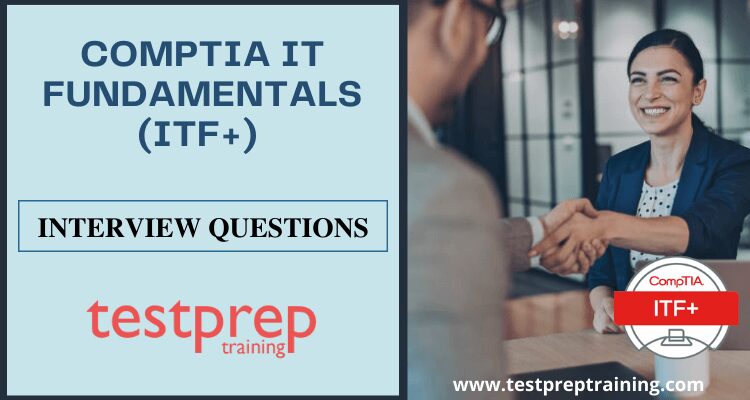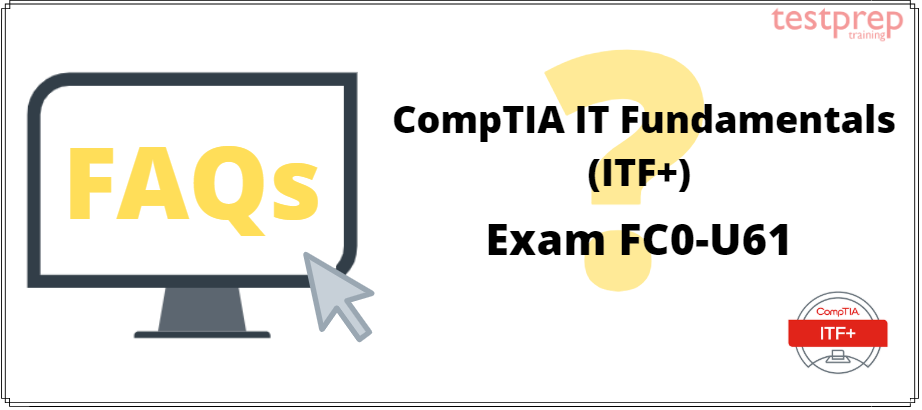CompTIA IT Fundamentals (ITF+) (FC0-U61)
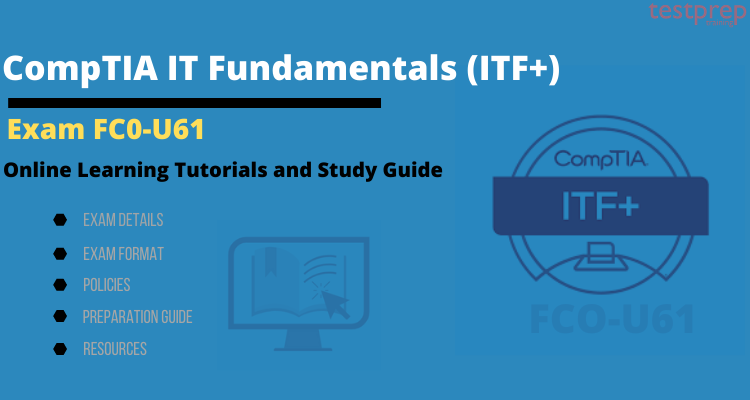
CompTIA IT Fundamentals (FC0-U61) exam focuses on the essential IT skills and knowledge that are necessary for performing tasks operated by advanced end-users and entry-level IT professionals. The tasks include:
- Operating features and functions of common operating systems and then, establishing network connectivity
- Identifying common software applications and their purpose
- Using security and web browsing best practices
However, this exam will help the candidate to acquire knowledge and skills to identify and explain the basics of computing, IT infrastructure, application and software, software development, database fundamentals and security. In addition, candidates will be able to demonstrate their knowledge in:
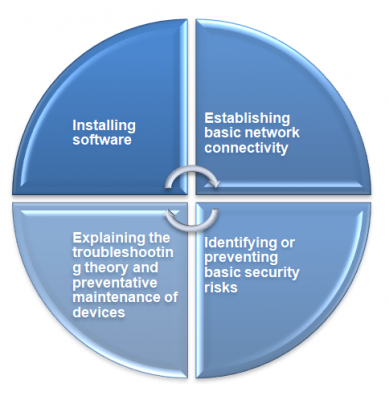
Target Audience
FC0-U61 is designed for candidates who are:
- Advanced end users and are considering a career in IT.
- Candidates who want to pursue professional-level certifications.
- Professionals with a good understanding of IT.
- Marketing, sales, and operations staff in IT-based organizations.
What’s there for professionals?
CompTIA ITF+ provides professionals to decide if a career in IT is right for them or to develop a broader understanding of IT
- ITF+ helps students or the career changers to determine if they have competency for information technology and if it is the right career path for them.
- This certification covers all areas of IT foundations, creating a broader understanding of IT making it ideal for non-technical professionals.
- ITF+ establishes an IT education framework for candidates in mid-school and high school.
CompTIA IT Fundamentals (ITF+) Interview Questions
Building Up Skills!
CompTIA ITF+ (FC0-U61) exam validates the knowledge and skills for identifying and explaining the basics of computing, IT infrastructure, software development, and database. However, with this, the candidates will be given access to enhance their skills to understand the concepts better. The skills include:
![]() It includes IT concepts that will help in illustrating the basics of computing and explain the value of data and troubleshooting.
It includes IT concepts that will help in illustrating the basics of computing and explain the value of data and troubleshooting.
![]() In this, you will learn how to set up and install common peripheral devices to a laptop/PC or secure a basic wireless network.
In this, you will learn how to set up and install common peripheral devices to a laptop/PC or secure a basic wireless network.
![]() Then, the process of managing applications software, understand the various components of an operating system. And, explaining the purpose of methods of application architecture.
Then, the process of managing applications software, understand the various components of an operating system. And, explaining the purpose of methods of application architecture.
![]() It will help in understanding the programming language categories, interpret logic, and understand the purpose of programming concepts.
It will help in understanding the programming language categories, interpret logic, and understand the purpose of programming concepts.
![]() Candidates will be able to explain database concepts, structures, and purposes, as well as understands methods used to the interface.
Candidates will be able to explain database concepts, structures, and purposes, as well as understands methods used to the interface.
![]() You will understand and learn about the confidentiality, integrity, and availability concerns of secure devices and best practice methods.
You will understand and learn about the confidentiality, integrity, and availability concerns of secure devices and best practice methods.
Exam Format
CompTIA provides all the accessible information to the candidates for the FC0-U61 exam. Talking about the exam format, the CompTIA ITF+ exam will have maximum of 75 multiple choice questions with a time duration of 60 minutes. To pass the exam, candidates have to score a minimum of 650 (on a scale of 900). However, the exam is available in English but for non-English speaking countries candidates can check the exam policies. FC0-U61 exam will cost $123 USD and this exam retires usually after three years of launch.
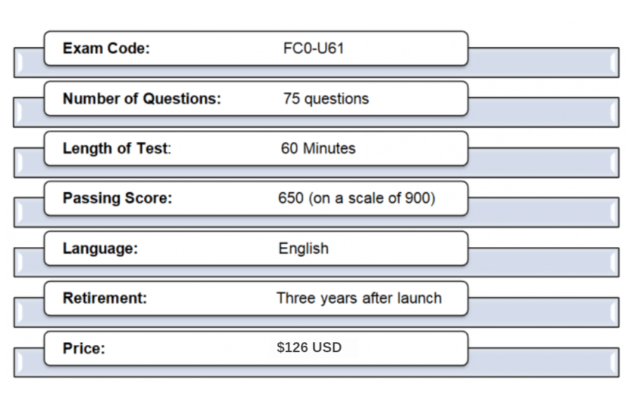
Applying for the Exam
CompTIA provides two ways to take the FC0-U61 exam that are either online or in-person. In which online testing provides convenience to test for your certification from any quiet, distraction-free, and secure location at any time. And, it also provides flexibility to schedule your exam at any hour convenient with technical support if something goes wrong during the exam. On the other hand, In-person testing provides testing options at any of the thousands of Pearson VUE test centers located around the world.
The exam can be scheduled at, 
Course Outline
The CompTIA IT Fundamentals (ITF+) (FC0-U61) exam objectives include:
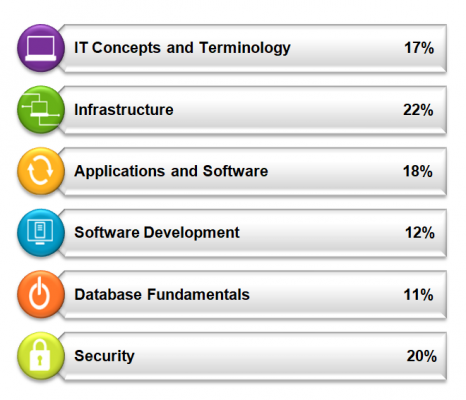
First Topic: IT Concepts and Terminology
1.1 Comparing and contrasting notational systems
- Binary
- Hexadecimal
- Decimal
- Data representation
- ASCII
- Unicode
1.2 Contrasting and explaining the fundamental data types and their characteristics
- Char
- Strings
- Numbers
- Integers
- Floats
- Boolean
1.3 Describing about the basics of computing and processing
- Input
- Processing
- Output
- Storage
1.4 Explaining the value of data and information
- Data and information as assets
- Importance of investing in security
- Relationship of data to
- creating information
- Intellectual property
1.5 Comparing and explaining common units of measure
- Storage unit
- Throughput unit
- Processing speed
1.6 Describing the troubleshooting methodology
- Identifying the problem
- Researching knowledge base/ Internet, if applicable
- Establishing a theory of probable cause
- Testing the theory to determine the cause
- Establishing a plan of action to resolve the problem and identify potential effects
- Implementing the solution or escalate as necessary
- Verifying full system functionality and, if applicable, implement preventive measures
- Documenting findings/lessons learned, actions, and outcomes
Second Topic: Infrastructure
2.1 Classifying common types of input/output device interfaces
- Networking
- Peripheral device
- Graphic device
2.2 Provided scenario to set up and install common peripheral devices to a laptop/PC.
- Devices
- Installation types
2.3 Explaining the purpose of common internal computing components
- Motherboard/system board
- Firmware/BIOS
- RAM
- CPU
- Storage
- GPU
- Cooling
- NIC
2.4 Comparing and contrasting common Internet service types
- Fiber optic
- Cable
- DSL
- Wireless
2.5 Contrasting and explaining storage types
- Volatile vs. non-volatile
- Local storage types
- Local network storage types
- Cloud storage service
2.6 Comparing and explaining common computing devices and their purposes
- Mobile phones
- Tablets
- Laptops
- Workstations
- Servers
- Gaming consoles
- IoT
2.7 Explaining basic networking concepts
- Basics of network communication
- Device addresses
- Basic protocols
2.8 Scenario to install, configure and secure a basic wireless network
- 802.11a/b/g/n/ac
- Best practices
Third Topic: Applications and Software
3.1 Explaining the purpose of operating systems
- The interface between applications and hardware
- Disk management
- Process management/scheduling
- Application management
- Memory management
- Device management
- Access control/protection
- Types of OS
3.2 Comparing and contrasting components of an operating system
- File systems and features
- Features
- File management
- Services
- Processes
- Drivers
- Utilities
- Interfaces
3.3 Explaining the purpose and proper use of software
- Productivity software
- Collaboration software
- Business software
3.4 Describing methods of application architecture and delivery models
- Application delivery methods
- Application architecture models
3.5 Providing a scenario to configure and use web browsers
- Caching/clearing cache
- Deactivate client-side scripting
- Browser add-ons/extensions
- Private browsing
- Proxy settings
- Certificates
- Popup blockers
- Script blockers
- Compatible browser for application(s)
3.6 Contrasting and explaining general application concepts and uses
- Single-platform software
- Cross-platform software
- Licensing
- Software installation best practices
Fourth Topic: Software Development Concepts
4.1 Comparing and contrasting programming language categories
- Interpreted
- Compiled programming languages
- Query languages
- Assembly language
4.2 Giving a scenario to use programming organizational techniques and interpret logic
- Organizational techniques
- Logic components
4.3 Explaining the purpose and use of programming concepts
- Identifiers
- Functions
- Objects
Fifth Topic: Database Fundamentals
5.1 Describing database concepts and the purpose of a database
- Usage of database
- Flat file vs. database
- Records
- Storage
5.2 Comparing and contrasting various database structures
- Structured vs. semi-structured vs. non-structured
- Relational databases
- Non-relational databases
5.3 Summarizing methods used to interface with databases
- Relational methods
- Database access methods
- Export/import
Sixth Topic: Security
6.1 Outlining confidentiality, integrity and availability concerns
- Confidentiality concerns
- Integrity concerns
- Availability concerns
6.2 Explaining methods to secure devices and best practices
- Securing devices (mobile/workstation)
- Device use best practices
6.3 Summarizing behavioral security concepts
- Expectations of privacy
- Written policies and procedures
- Handling of confidential information
6.4 Comparing and contrasting authentication, authorization, accounting and non-repudiation concepts
- Authentication
- Authorization
- Accounting
- Non-repudiation
6.5 Explaining password best practices
- Password length
- Complexity of password
- Password history
- Expiration of password
- Reusing password across sites
- Password managers
- Password reset process
6.6 Describing common uses of encryption
- Plain text vs. cipher text
- Data at rest
6.7 Understanding business continuity concepts
- Fault tolerance
- Disaster recovery
Reference: CompTIA® IT Fundamentals+ FC0-U61 Cert Guide
Testing Policies
CompTIA provides various exam testing policies for candidates that need to be taken care of. Moreover, these policies will help candidates to understand the certification exam procedure. Some of the policies are:
Exam Rescheduling
Candidates who want to reschedule the exam must contact Pearson VUE at least a minimum of 24 hours prior to your exam appointment. That is to say, rescheduling an exam less than 24 hours prior to your appointment or failure to appear for your appointment will result in the forfeiture of your exam fee.
Exam Language
CompTIA exam can be given in English language. However, for those who are in non-English speaking countries, a 30-minute time extension will be given during exams delivery. As all of CompTIA’s exams are available in English, ESL is not available in English-speaking countries. During registration for the exams at Pearson VUE, ESL will be granted to candidates if the country is eligible.
Exam Scoring
CompTIA monitors the performance of all exams to ensure the validity of exam results. However, during monitoring of exams CompTIA may classify scores as indeterminate when there are discrepancies for which there is no reasonable explanation. Scores that are unclear will not be considered valid and will not be eligible for certification. And, the exam passing scores are set using statistical analysis and are subject to change. After the exam completion, candidates will receive a score report that contains important information regarding the outcome of the exam. Moreover, CompTIA does not publish exam passing rates because exam questions and passing rates are subject to change without notice.
Further, to understand more about the CompTIA agreements and policies, you can take a look at CompTIA exam test policies.
For More Queries Visit: CompTIA ITF+ (FC0-U61) Exam FAQs
CompTIA IT Fundamentals (ITF+) (FC0-U61) Study Guide
For CompTIA ITF+ (FC0-U61) exam, there are various methods provided below to prepare and pass the exam with good scores.
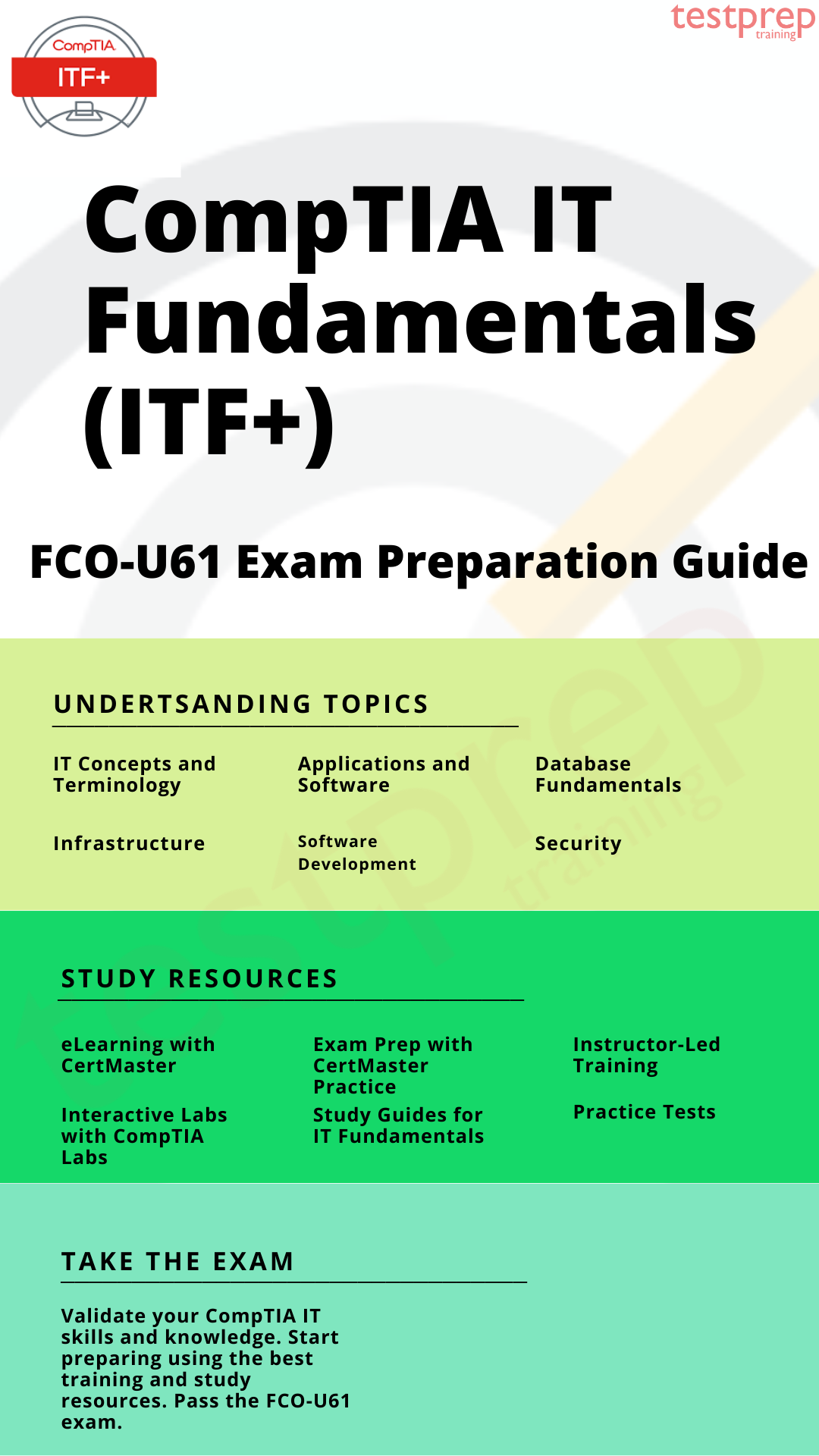
eLearning with CertMaster Learn: IT Fundamentals
CompTIA gives candidates to have access to the eLearning solution that is CertMaster Learn. CertMaster Learn is interactive and self-paced that includes a customizable learning plan and performance-based questions for IT Fundamentals. However, this will help in taking you on a path of consistent learning toward your certification exam.
CompTIA Labs for IT Fundamentals
CompTIA Labs for IT Fundamentals help the candidate to acquire the necessary hands-on skills for your IT Fundamentals certification. Moreover, they will develop a deeper understanding of the subject matter and the practical aspects of the IT Fundamentals certification exam objectives. CompTIA Labs also helps candidates to address the practical aspects of ITF+ exam objectives and complement prior training through access to real equipment and software environments.
Exam Preparation with CertMaster Practice: IT Fundamentals
CertMaster Practice is a tool that assesses your knowledge and exam readiness. This is filled with question-first design, real-time learning analytics, and content refreshers. Moreover, This will help candidates to prepare well by confirming strong areas and filling knowledge gaps in weak areas during studying.
Study Guides for IT Fundamentals
While studying for the exam, it is good to prefer traditional textbook style learning, which is packed with informative and accessible content covering all IT Fundamentals exam objectives. However, for the ITF+ (FC0-U61) exam CompTIA provides a study guide that is, CompTIA IT Fundamentals FC0-U61 Certification Study Guide.
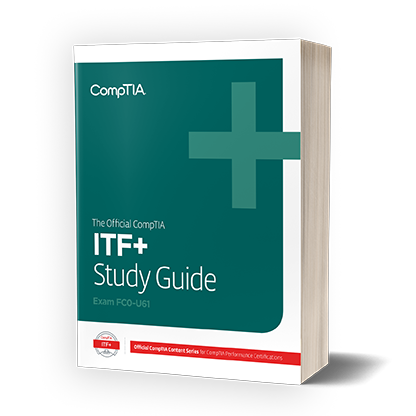 : This study guide is designed to help candidates acquire the knowledge and skills to set up and use a computer at home securely. Moreover, this will also assist you in preparation for the CompTIA certification exam. And, it will provide informal support for PCs and simple computer networks to your colleagues in a small business.
: This study guide is designed to help candidates acquire the knowledge and skills to set up and use a computer at home securely. Moreover, this will also assist you in preparation for the CompTIA certification exam. And, it will provide informal support for PCs and simple computer networks to your colleagues in a small business.
Instructor-Led Training
For those looking for in-classroom or live online training, CompTIA provides best-in-class instructor-led training for both individuals and teams. These CompTIA IT Fundamentals (ITF+) (FC0-U61) exam training sessions will help the candidates to understand the concepts more accurately in a short duration.
Exam Practice Tests
Practice tests are important during exam preparation time. That is to say, by assessing yourself with these CompTIA IT Fundamentals (ITF+) (FC0-U61) practice tests you will know about your weak and strong areas. We all know times plays an essential role during the exam. So, by practicing you will be able to improve your answering skills that will result in saving a lot of time. Moreover, the best way to start doing practice tests is after completing one full topic as this will work as a revision part for you. There are many sources that provide free practice test for the CompTIA FC0-U61 exam.
Joining Study Groups
During the exam preparation time, it is good to join study groups. These groups will help you to stay connected with the other people who are on the same pathway as yours. Moreover, here you can start any discussion about the issue related to the exam or any query. By doing so, you will get the best possible answer to your query.

